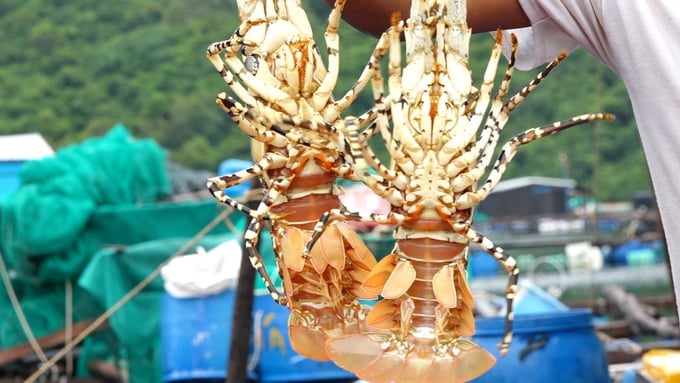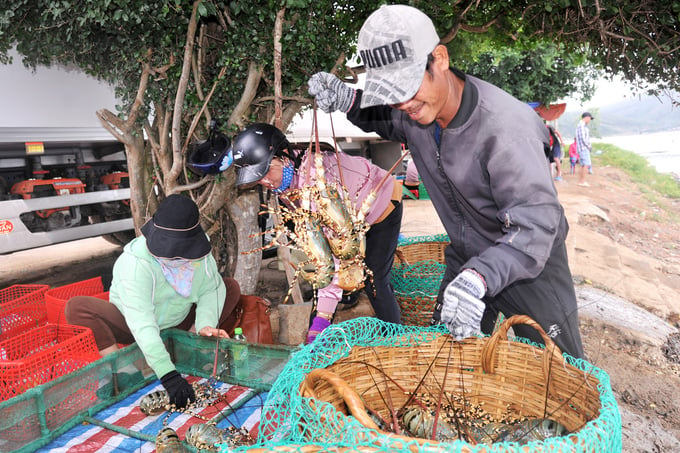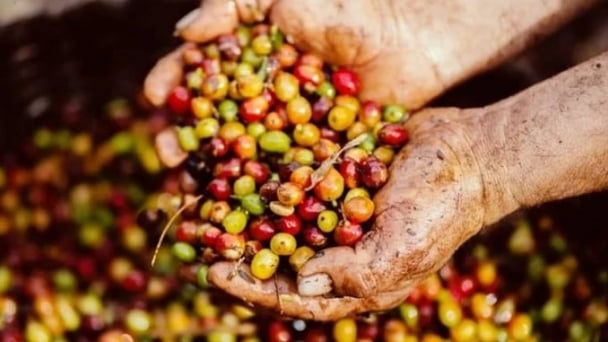June 17, 2025 | 22:34 GMT +7
June 17, 2025 | 22:34 GMT +7
Hotline: 0913.378.918
June 17, 2025 | 22:34 GMT +7
Hotline: 0913.378.918
On November 13, the Department of Quality, Processing, and Market Development submitted a report to Deputy Minister of Agriculture and Rural Development Tran Thanh Nam regarding the Department's discussion with the Department of Animal Health Inspection under the General Administration of Customs of China regarding the export of spiny lobster.
In response to the proposal made by the Department of Quality, Processing, and Market Development in September 2023, the Vietnam Trade Office in China organized an online on November 10 with the aim of addressing challenges faced by Vietnamese businesses in exporting spiny lobster to the Chinese market. Participants of the meeting include the General Administration of Customs of China, which comprises the Department of Animal Health Inspection and local customs for the cities of Shenzhen, Guangzhou, and Nanning - major Chinese importers of Vietnamese spiny lobster: On the other hand, VIetnamese participants include the Department of Quality, Processing, and Market Development, Directorate of Fisheries, and the Vietnam Trade Office. Discussions at the meeting centered around the state of spiny lobster exports to China.

China stated that spiny lobster farmers must verify that their products are not harvested from the sea, and they must provide comprehensive documentations of their farming process. Additionally, the use of naturally-harvseted breeding stock is prohibited (the breeding stock must belong to the F2 generation). Photo: Kim So.
During the session, the Department of Quality, Processing, and Market Development commended collaboration efforts from China's Department of Animal Inspection and Quarantine in promoting the export of live seafood from Vietnam to China, including spiny lobster. To date, the Chinese government has approved 46 lobster packaging facilities for export to China.
Additionally, the Department of Quality, Processing, and Market Development highlighted unidentified obstacles in Vietnam's export of spiny lobster to China since August 2023. Accordingly, the Department contacted China's Department of Animal Inspection and Quarantine for updates and information regarding new policies, but they did not provide a response.
The Directorat of Fisheries provided relevant information regarding lobster farming activities in Vietnam, including farming subjects, practices, volume, and breeding sources, as per China's request.
During the meeting, the China's Department of Animal Inspection and Quarantine and the General Administration of Customs announced China's newest regulations on spiny lobster as follows:
Regarding naturally harvested spiny lobster: China amended its List of Endangered wild animals subject to protection in 2021, with spiny lobster rated as a second-level protected species (effective from February 1, 2021). Additionally, China revised its Law on Wildlife Protection in May 2023. Consequently, the country prohibited the capture, use, trade, and sale of spiny lobster and species listed in the aforementioned protected species list.
The General Administration of Customs of China has internally notified local Customs authorities regarding the implementation of these regulations.
The Ministry of Agriculture and Rural Affairs of China is the regulatory body responsible for establishing and managing regulations for naturally harvested spiny lobster. As a result, the Ministry is the recommended point of contact for Vietnamese stakeholders seeking in-depth information.
Regarding farmed spiny lobster: farmed spiny lobster is identified by clear evidence of the farming process. Additionally, the use of naturally-harvseted breeding stock is prohibited (the breeding stock must belong to the F2 generation).
Regarding import procedures for farmed spiny lobster into China: Chinese importers must obtain a Wildlife Protection license from the Department of Fisheries under the Ministry of Agriculture and Rural Affairs of China.
Regarding customs clearance procedures and food safety inspections: No considerable changes have been made compared to existing regulations.
Regarding requirements for export packaging facilities and lobster farms: Stakeholders must register a list with detailed information regarding their facilities.
The Department of Quality, Processing, and Market Development has announced that it will issue a new registration form, via the Vietnam Trade Office in China, regarding the review and registration of export packaging facilities and lobster farms. After receiving the registration list from Vietnam, China will conduct online and/or on-site inspections of registered facilities. Subsequently, China will publish the list of approved Vietnamese packaging and farming facilities on the website of the General Administration of Customs of China.
With the aim of boosting the export of Vietnamese naturally-harvested live seafood to China, representatives from China proposed both parties to promptly review and sign a Memorandum of Understanding on the control of naturally-harvested live seafood exports from Vietnam to China. The proposal will be sent to Vietnam via the Vietnam Trade Office in China.
China also suggested the Department of Quality, Processing, and Market Development to forward the proposal to relevant Vietnamese agencies for an early review of the issue of importing Chinese sturgeon into Vietnam. The Department of Quality, Processing, and Market Development has conveyed this information to representatives from the Directorate of Fisheries at the meeting.
Based on information provided by the General Administration of Customs of China and representatives from the Vietnam Trade Office in China during the working session, it is evident that the obstacles in the export of Vietnamese spiny lobster to China are related to the protection of endangered and rare animals, and the procedures for both importers and exporters to certify that their farming processes meet said requirements. On the other hand, no changes have been made to food safety requirements and customs procedures.

Vietnam's export of spiny lobster to China has faced numerous challenges since August 2023. Photo: Kim So.
In response to China's announcements, the Department of Quality, Processing, and Market Development proposes the Ministry of Agriculture and Rural Development to deploy the following tasks:
The Department of Quality, Processing, and Market Development will continue to exchange information with the Department of Animal Inspection and Quarantine and the General Administration of Customs of China. Subsequently, the Department will update and inform Vietnamese export packaging facilities and lobster farms about China's regulations and registration forms for the export of live spiny lobster;
After receiving the new registration forms from China, the Directorate of Fisheries will coordinate with local governments to review, inspect, and complete the list of qualified farms exporting spiny lobster to China. Subsequently, the Department of Quality, Processing, and Market Development will send the list to China;
The Department of Quality, Processing, and Market Development will be assigned as the focal point for receiving documents and registrations with relevant Chinese authorities, organizing online or direct meeting with the Chinese inspection team when required;
The Department of Quality, Processing, and Market Development will coordinate with the Directorate of Fisheries and the Department of Animal Health to advise on the development of a Memorandum of Understanding on the export of naturally-harvested live seafood from Vietnam to China after receiving the official proposal from China's Department of Animal Inspection and Quarantine.
Translated by Nguyen Hai Long
![Turning wind and rain into action: [7] Early disaster warnings help marine farmers minimize losses](https://t.ex-cdn.com/nongnghiepmoitruong.vn/608w/files/news/2025/06/17/z6704423696987_15fd32ffc26d590d204d520c9dac6786-nongnghiep-142942.jpg)
(VAN) In recent years, thanks to early disaster warnings and forecasting, marine farmers in Khanh Hoa province have been able to reduce risks and losses, thereby improving production efficiency.
![Turning wind and rain into action: [5] Hue applies modern technology in disaster forecasting](https://t.ex-cdn.com/nongnghiepmoitruong.vn/608w/files/news/2025/06/17/z6704423696987_15fd32ffc26d590d204d520c9dac6786-nongnghiep-093938.jpg)
(VAN) In Hue city, modern technology has recently been applied in meteorological and hydrological forecasting and warning, helping to reduce the damage caused by natural disasters.

(VAN) A cutting-edge farming technique being implemented on an experimental ranch in Arizona's Sonoran Desert has already saved a billion gallons of water over five years, according to Civil Eats.

(VAN) Poultry and pig production and the environment can be boosted through enhanced water technology, according to new research.

(VAN) Coffee prices on June 16, 2025 are unchanged. In Vietnam, local trading prices are holding steady, ranging around VND 112,000 – VND 112,500/kg.
![Turning wind and rain into action: [4] Bringing climate bulletins to remote and isolated areas](https://t.ex-cdn.com/nongnghiepmoitruong.vn/608w/files/linhnhp/2025/06/14/1152-z6704423696987_15fd32ffc26d590d204d520c9dac6786-nongnghiep-151141.jpg)
(VAN) The Vietnam Agriculture and Nature Newspaper interviewed Mr. Vu Thai Truong, Acting Head of Climate Change and Environment at UNDP Vietnam, to gain deeper insight into how climate bulletins are delivered to farmers.

(VAN) In Tien Giang, a high-tech shrimp farm has developed a distinctive energy-saving farming model that has yielded promising results.